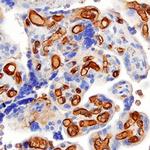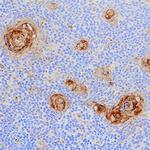FIGURE: 1 / 2
CD153 Antibody (PA5-47045) in IHC (P)


Product Details
PA5-47045
Species Reactivity
Host/Isotype
Class
Type
Immunogen
Conjugate
Form
Concentration
Purification
Storage buffer
Contains
Storage conditions
Shipping conditions
RRID
Product Specific Information
In direct ELISAs, less than 10% cross-reactivity with recombinant human (rh) CD27 Ligand is observed and less than 1% cross-reactivity with rhCD40 Ligand is observed.
Reconstitute at 0.2 mg/mL in sterile PBS.
Target Information
The ligand for CD30 is CD30L (CD153). The binding of CD30 to CD30L mediates pleiotropic effects including cell proliferation, activation, differentiation, and apoptotic cell death. CD30 has a critical role in the pathophysiology of Hodgkin's disease and other CD30+ lymphomas. CD30 acts as a costimulatory molecule in thymic negative selection. In addition to its expression on Hodgkin's and Reed-Sternberg cells, CD30 is also found in some non-Hodgkin's lymphomas (including Burkitt's lymphomas), virus-infected T and B cells, and on normal T and B cells after activation. In T cells, CD30 expression is present on a subset of T cells that produce Th2-type cytokines and on CD4+/CD8+ thymocytes that coexpress CD45RO and the IL4 receptor.
For Research Use Only. Not for use in diagnostic procedures. Not for resale without express authorization.
References (0)
Bioinformatics
Protein Aliases: CD153; CD153 antigen; CD30 antigen ligand; CD30 ligand; CD30-L; CD30ligand; tumor necrosis factor (ligand) superfamily member 8; tumor necrosis factor (ligand) superfamily, member 8; tumor necrosis factor ligand 3A; Tumor necrosis factor ligand superfamily member 8
Gene Aliases: CD153; CD30L; CD30LG; TNFSF8; TNLG3A
UniProt ID: (Human) P32971
Entrez Gene ID: (Human) 944

Performance Guarantee
If an Invitrogen™ antibody doesn't perform as described on our website or datasheet,we'll replace the product at no cost to you, or provide you with a credit for a future purchase.*
Learn more
We're here to help
Get expert recommendations for common problems or connect directly with an on staff expert for technical assistance related to applications, equipment and general product use.
Contact tech support
